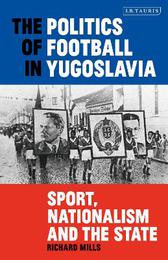
|
The Politics of Football in Yugoslavia: Sport, Nationalism and the State
Paperback / softback
Main Details
| Title |
The Politics of Football in Yugoslavia: Sport, Nationalism and the State
|
| Authors and Contributors |
By (author) Richard Mills
|
| Physical Properties |
| Format:Paperback / softback | | Pages:416 | | Dimensions(mm): Height 216,Width 138 |
|
| Category/Genre | Sport and leisure industries |
|---|
| ISBN/Barcode |
9781838603823
|
| Classifications | Dewey:796.33409497 |
|---|
| Audience | | Tertiary Education (US: College) | |
|---|
| Illustrations |
34 bw integrated, 5 maps
|
|
Publishing Details |
| Publisher |
Bloomsbury Publishing PLC
|
| Imprint |
Bloomsbury Publishing PLC
|
| Publication Date |
19 September 2019 |
| Publication Country |
United Kingdom
|
Description
Winner of the Lord Aberdare Literary Prize for 2018 Even before Tito's Communist Party established control over the war-ravaged territories which became socialist Yugoslavia, his partisan forces were using football as a revolutionary tool. In 1944 a team representing the incipient state was dispatched to play matches around the liberated Mediterranean. This consummated a deep relationship between football and communism that endured until this complex multi-ethnic polity tore itself apart in the 1990s. Starting with an exploration of the game in the short-lived interwar Kingdom, this book traces that liaison for the first time. Based on extensive archival research and interviews, it ventures across the former Yugoslavia to illustrate the myriad ways football was harnessed by an array of political forces. Communists purposefully re-engineered Yugoslavia's most popular sport in the tumult of the 1940s, using it to integrate diverse territories and populations. Subsequently, the game advanced Tito's distinct brand of communism, with its Cold War-era policy of non-alignment and experimentation with self-management. Yet, even under tight control, football was racked by corruption, match-fixing and violence. Alternative political and national visions were expressed in the stadiums of both Yugoslavias, and clubs, players and supporters ultimately became perpetrators and victims in the countries' violent demise. In Richard Mills' hands, the former Yugoslavia's stadiums become vehicles to explore the relationship between sport and the state, society, nationalism, state-building, inter-ethnic tensions and war. The book is the first in-depth study of the Yugoslav game and offers a revealing new way to approach the complex history of Yugoslavia.
Author Biography
Richard Mills is lecturer in Modern European History at the University of East Anglia, where he received his PhD, and has recently become the course director there for the BA in Modern History. Mills has published in peer-reviewed journals, edited collections and the popular sports magazine When Saturday Comes. He has guest lectured at the CIES's prestigious FIFA master's programme.
ReviewsA well-researched and well-written book on the country, its history, politics, nationalism and, ultimately, on football. * European History Quarterly * An exciting read ... The depth and quality of the scholarship shine through, making this book an important contribution and, hopefully, part of an ongoing dialogue with scholars based in different regional academic traditions. * Journal of the Historical Association * Scrupulously researched and draws on a dazzling array of archival sources and marginal publications ... This highly original study undeniably makes a valuable and scholarly contribution to our understanding of Yugoslav history, and a thoughtful and convincing case for the continued examination of the overt and covert means by which sport is politicized. * Slavonic and East European Review * Admirably researched in archives throughout the former Yugoslavia, in dozens of periodicals, and in numerous memoirs, this book provides novel and thought-provoking insight into the intersection of state power, national/ethnic identity, and leisure activites. Summing up: recommended. * CHOICE * Well-written ... a rich monograph that marks a milestone in football research ... a valuable foundation given to the facts, perspectives and suggestions as well as material for expansion, deepening and reorientation. * H-Soz-Kult (Bloomsbury translation) * Enriched with vignettes, literary descriptions of sceneries and stadiums and personal impressions, and depicting legacies and leftovers of the Yugoslav past across the post-Yugoslav space, Richard Mills takes us to a fascinating journey through the world of the not always beautiful game. This long-awaited monograph is a brilliantly written and in-depth historical analysis based on the diversity of primary and secondary sources and, as such, it fulfils all expectations. * Reviews in History *
|